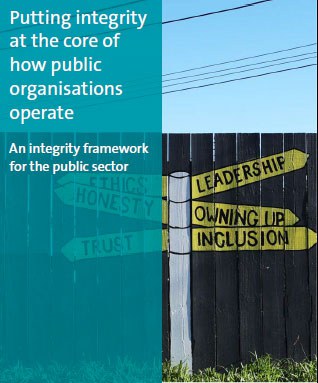Policies and procedures
Why it matters: Builds trust in the organisation by establishing processes that everyone is required to follow and staff understand why they are doing something
Policies and procedures that clearly communicate the values of the organisation support the practical day-to-day implementation of desired behaviours of all staff. Aligning policies to organisational values provides an explanation of why the policies matter and helps staff understand exactly what is expected of them in certain situations.
There are ways for staff to give feedback on policies which allows them to be constantly updated and developed so they are fit for purpose.”
Local authority staff member
For example, you can explain the importance of policies on conflicts of interest by referring to values such as independence and fairness.
If you are following our values, you will be following our policies.”
Local authority senior leader
What it looks like: Values embedded into the day-to-day activities and long-term culture of an organisation
An organisation's policies should have a clear purpose that is based on the organisation's values. Policies and procedures should make it easy for staff to know what they need to do in different circumstances. The process for ensuring that staff are complying with policies should be clear.
In terms of what they’ve done to change the culture, it’s about how you ‘walk the talk’, for example health and safety is about making sure people know it’s not just done because of a piece of legislation, it’s about a genuine commitment to getting people home safe.”
Local authority manager
Determining what policies and procedures a workplace needs will, to an extent, depend on the nature of its work. Policies and procedures should be tailored to an organisation's specific function, capabilities, and risks, including integrity risks. When preparing policies and procedures, it is good practice to consider how values are built into day-to-day activities.
We suggest that policies and procedures are:
- designed to clearly link to and reinforce an organisation's values;
- designed to support staff to live the organisation's values;
- developed and administered through a simple and transparent process; and
- prepared and reviewed with staff involved.
Involving staff in the development of policies and processes can help avoid unworkable or excessively burdensome processes and mean that they are more likely to be complied with.
For public service organisations, policies and procedures will need to align with the principles and values of the Public Service Act 2020, the Public Service Commissioner's code of conduct, and the Public Service Commissioner's minimum expectations in specific integrity areas (set out in model standards).37
 |
It's worth considering...
|
37: The Public Service Commissioner has issued model standards on a range of topics, including positive and safe workplaces, workforce assurance, speaking up, conflicts of interest, information gathering and public trust, and chief executive gifts, benefits, and expenses.


